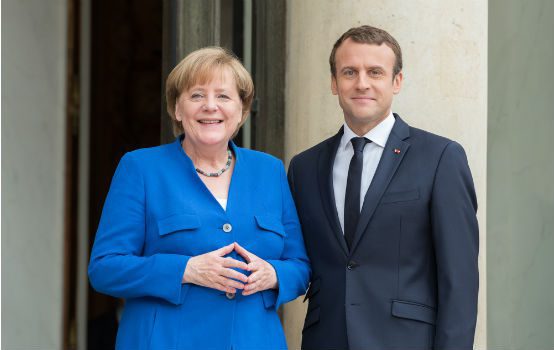Europe’s Counterpunch to America Over the Iran Deal
Donald Trump has shaken our transatlantic relationships to their foundations. Now the Europeans are fighting back.
Donald Trump may have inadvertently done Europe a favor. By unilaterally and definitively violating the Iran nuclear deal, the Trump administration is galvanizing Europeans in unprecedented ways to challenge the capricious use of U.S. secondary sanctions and American dominance of the global financial system.
These sanctions—which threaten to penalize non-U.S. companies for commerce that would otherwise be legal—are returning with a vengeance after the president’s announcement on May 8 that America is walking out of the Joint Comprehensive Plan of Action (JCPOA). In response, Britain, France, and Germany, in conjunction with the European Union, are working with Iran—and potentially Russia and China—to salvage the agreement and institute countermeasures.
Federica Mogherini, the high representative for foreign policy at the EU, announced on May 15 that experts are looking for ways of “maintaining and deepening economic relations with Iran.” These include ensuring “the continued sale of Iran’s oil and gas condensate petroleum products and petrochemicals,” establishing effective banking relationships, transportation, export credits, and other financing mechanisms for trade and investment with Iran, and protecting EU “economic operators and ensuring legal certainty.”
As of this writing, it is by no means assured that Europe can come up with measures that will fulfill these goals. Major multinational firms, weighing the benefits of an $18 trillion U.S. market versus Iran’s $400 billion market, may quietly wind down their Iran business to meet an American deadline six months from now.
But something is changing in the transatlantic relationship that gives hope to those seeking to maintain the JCPOA and to augment Europe’s role as a major economic and diplomatic player.
“There was until now no political will” to challenge the U.S. in this way, said Delphine O, a member of the French National Assembly, speaking on May 15 at the Atlantic Council. “I think this has changed.”
Omid Nouripour, a member of the German parliament who also spoke at the Atlantic Council, said Trump’s decision to quit the JCPOA and re-impose secondary sanctions—at a time when Iran has complied with the required restrictions on its nuclear program—has created a transatlantic crisis worse than during the Vietnam and Iraq wars.
With Vietnam, he said, Europeans were “touched by the pictures” of suffering Vietnamese; with Iraq, “no one had an idea if there was a plan for the day after” and didn’t anticipate the chaos the removal of Saddam Hussein would bring to the Middle East. With the Iran deal, however, he said, “the core security interests of Europe are touched.”
Nouripour warned that if Iran also left the JCPOA and resumed its full nuclear program, it would touch off a cycle of proliferation “starting with Saudi Arabia and ending with Turkey.” The presence of nuclear weapons so close to Europe, he said, would be akin to the Cuban Missile Crisis of the 1960s when the Soviet Union put nuclear weapons 90 miles off of American shores.
This threat—and the seemingly cavalier way in which it was precipitated following strenuous European efforts to keep the U.S. in the Iran deal—is shaking the foundations of the transatlantic relationship and an international world order that the United States was instrumental in establishing after World War II. It comes as Washington is threatening a trade war with Europe over aluminum and steel, excoriating the Europeans for not spending more on their own defense, and taking other controversial steps—such as leaving the Paris climate accords and moving the U.S. embassy in Israel to Jerusalem—that contradict EU and international policy.
“There is a shrinking political space in our countries for people who will support this transatlantic relationship,” warned the French parliamentarian, O, who comes from the La République En Marche party of President Emmanuel Macron.
France, she said, has been preparing for this moment for a year, even while trying to convince the United States to remain within the agreement. While in the past she’d had trouble getting the French interested in the topic of secondary sanctions, that has now changed.
“I’ve never seen such a mobilization at all levels…on this issue,” O said. “Not because people care about Iran so much” but because of patriotism and “a way of saying ‘we do not bend to the Americans.’”
The crisis between Europe and the United States is a boon, of course, to Russia and China, which see the American withdrawal as favoring their own interests in Iran. During the last period of severe sanctions on Iran, both abided by UN restrictions on arms transfers to the Islamic Republic. But China, in particular, kept up a robust economic relationship and overtook the EU as Iran’s major trading partner.
China, because of the size of its economy, is well equipped to benefit now if European companies shy away from Iran. It can take over the French oil company Total’s major investment in an Iranian gas field and boost an already growing oil futures market denominated in yuan rather than dollars.
Russia, burdened by its own sanctions over Ukraine, is also exploring new Iran business.
Nouripour predicted that the EU would have to collaborate with Russia and China to salvage the JCPOA. President Trump, he said, is “driving us into the arms of the Chinese and Russians.”
The Trump administration seems to believe that Europe will pressure Iran to resume negotiations on a “better” deal than the JCPOA. But the Europeans say that while they will continue conversations with Washington about Iran, the responsibility for devising a new strategy to contain both Iran’s nuclear program and its regional ambitions lies with the Trump administration.
“We have not seen (anything),” said Caroline Vicini, deputy head of the EU delegation to the United States. “It’s up to the United States to come up with a plan.”
Barbara Slavin directs the Future of Iran Initiative at the Atlantic Council.
http://www.theamericanconservative.com/articles/europes-counterpunch-to-america-over-the-iran-deal/

0 Comments:
Post a Comment
Subscribe to Post Comments [Atom]
<< Home